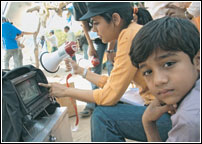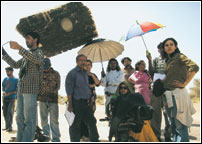
A saviour of Pakistani cinema?
By Shanaz Ramzi
At a time when cinema owners in Pakistan are protesting against the lack of government support in battling with the forces responsible for the continuing decline in investment, production and exhibition of films, there is welcome, if not surprising news that a major new initiative is in progress to create a Pakistani film for international audiences.
Mehreen Jabbar, one of Pakistan’s outstanding young directors who has directed and produced a large number of highly acclaimed, award-winning TV serials and plays including New York Stories, Pehchaan, Kahaniyaan and Putli Ghar, has recently completed the filming phase of her first directorial venture into big-screen cinema. What’s more, her father Javed Jabbar is the executive producer of the film. It may be recalled that Javed Jabbar wrote, produced and directed the first Pakistani film in English titled Beyond the Last Mountain, released to critical acclaim domestically and in international film festivals in 1976. In the ’70s and ’80s he had also written and direc-ted several award-winning documentaries.
In an exclusive interview to Images, Mehreen Jabbar not only broke the news about her forthcoming film, Ramchand Pakistani, but also disclosed bits of information about it, so far kept a closely guarded secret. She informed that the story-line of the film, as can be guessed by its working title, “is deeply rooted in the complex relationships that characterise interactions between Pakistan and India, and Muslims and Hindus. However, the film is aimed at audiences across South Asia and the world.”
------------------------------------------------------------ --------------------
Nandita plays Champa, a Pakistani Hindu woman who is left desolate when her young son and husband disappear one day from their village at the Pakistan-India border near Nagarparkar, in Tharparkar
------------------------------------------------------------ --------------------
Inspired by actual events, the story is written by her father, while Mohammad Ahmed, who has many popular tele-plays and TV serials to his credit, has written the screenplay and dialogues. “The film is in Urdu, with a Hindi version, but for international audiences it will be sub-titled in English and other foreign languages,” she adds.
Interestingly, the film brings together prominent personalities and professionals from Pakistan, the US and India. In fact, Ramchand Pakistani will possibly be the first Pakistani movie, and certainly the first since 1971, in which some of the pivotal characters are portrayed as Pakistani Hindus. Leading Indian actress Nandita Das, well-known and widely respected for her roles in films like Fire, Earth, Bhawinder, Provoked, Aks, and several others, plays the lead female role in the film.
Nandita plays Champa, a Pakistani Hindu woman who is left desolate when her young son and husband disappear one day from their village at the Pakistan-India border near Nagarparkar, in Tharparkar. Nandita Das is the only Indian, or for that matter, non-Pakistani actor in the large cast comprising well-known Pakistani TV and stage personalities including Rashid Farooqi, Noman Aijaz, Maria Wasti, Zhalay Sarhadi, Syed Fazal Ahmed, (who plays the title role) Farooq Pario, Shahood Alvi, Salim Mairaj, Tipu and Navaid Jabbar (no relation to the producer or director).
Music and background songs are also the collective work of Pakistani and Indian artistes. The music is composed by Debajyoti Mishra from India, whose recent score for Raincoat became very popular and who has a large number of award-winning compositions to his credit. Lyrics are written by the celebrated Pakistani media personality Anwar Maqsood, while the songs are rendered by Shobha Mudgul of India and Shafqat Amanat Ali Khan of Pakistan.
According to Jabbar, filming was conducted entirely in Pakistan in February and March 2007 in different parts of Tharparkar, in rural Mirpurkhas and on a special large set representing an Indian prison constructed in rural Karachi. However, post-production of the film is taking place overseas and is expected to be completed by September this year.
A Pakistan-United States co-production, the film is being presented by two allied Pakistani firms — JJ Media and Project One. One hopes that this film will herald a new wave of quality Pakistani films that will be of interest to viewers around the world.






 OKE
OKE


